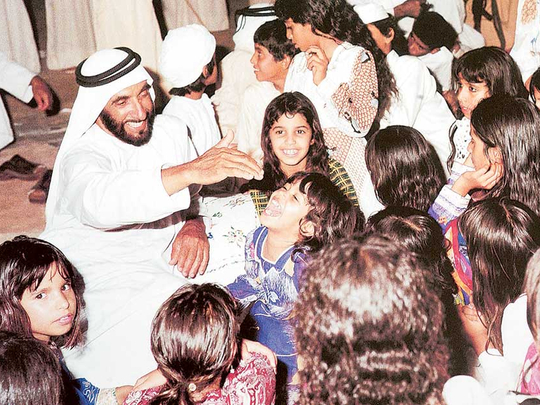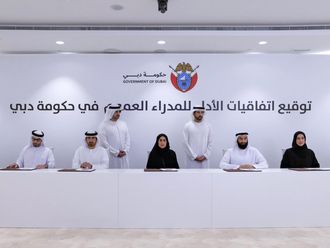
Abu Dhabi: The legacy of the Founding Father of the UAE, Shaikh Zayed Bin Sultan Al Nahyan, will be fondly remembered today (Friday), the 12th anniversary of his death.
The 19th day of Ramadan is designated as Zayed Humanitarian Day across the country.
Shaikh Zayed, the Ruler of Abu Dhabi from 1966 and UAE President from the formation of the Federation on December 2, 1971 until his death, in 2004, was widely loved and respected as a benevolent Arab and world statesman — he always upheld the principles of benevolence and humanitarian work, and encouraged others all through his life to protect the values of human generosity.
The 12th death anniversary of Shaikh Zayed reminds citizens and residents of the importance of the humanitarian work and the culture of giving as lessons learnt from the late Ruler.
Shaikh Zayed represented generosity and instilled the love of giving in the hearts of his people who should remember him on this day for his humanity that has elevated the UAE to a global humanitarian platform.
As part of his legacy, donor organisations in the UAE respond immediately to people suffering in disaster situations and help refugees requiring assistance.
Help was extended to the world’s needy regardless of race, religion or colour, to alleviate the suffering of those affected by conflict and natural disasters and to provide them with a decent living.
Shaikh Zayed had set up the Abu Dhabi Fund for Development well before the establishment of the UAE to help developing countries achieve growth and development through assistance in the form of concessionary loans, development grants and equity participation.
Zayed Humanitarian Day serves as a reminder to follow the example of a leader who was ahead of his time when it came to taking up humanitarian causes.
Shaikh Zayed truly represents the spirit of generosity and giving and is the one who has instilled a love of giving in the hearts of his people.
The UAE, under the wise leadership of President His Highness Shaikh Khalifa Bin Zayed Al Nahyan, had always followed the legacy of Shaikh Zayed in providing support for the needy worldwide.
The UAE was named the world’s largest donor of official development aid during 2014, relative to its national income, for the second year.
The UAE was named the world’s largest donor of official development assistance for two years running after it offered Dh18 billion, representing 1.17 per cent of Gross National Income, and Dh19.84 billion, representing 1.34 per cent of its Gross National Income, respectively, according to the Organisation for Economic Cooperation and Development (OECD).
The Development Assistance Committee (DAC) of OECD commended the UAE’s efforts to enhance and support international development.
The report highlighted the merit of the UAE’s achievement as the world’s biggest donor nation in proportion to the Gross National Income (GNI), noting that none of the DAC member states had made such a large contribution for 50 years.
The UAE exceeded the UN’s target of a contribution of 0.7 per cent of GNI, providing 1.34 per cent of its GNI as Official Development Assistance in 2013.
From 1971 to 2004, the UAE has given Dh90.5 billion worth of aid in various forms to 117 countries around the world.
Shaikh Zayed was also very committed to the Palestinian cause. A pan-Arab nationalist, he continuously voiced his concern and discontent at the state of affairs of Palestinians, repeatedly calling upon the international community to help find a fair and just solution to the Middle East conflict.
If during the early 1970s Abu Dhabi’s financial reserves were modest, it was because Shaikh Zayed dedicated a significant portion — running into hundreds of millions of dollars — to the Arab world.
The UAE foreign aid covered all continents, with Africa receiving the largest share — Dh21.7 billion between 2009 and 2013. Asia came second with Dh13.4 billion.
During the past 44 years, Asia was the main beneficiary of support and aid money provided, with a total of Dh79.4 billion, followed by Africa with Dh75.4 billion, pumped into development projects such as housing complexes, roads, bridges, power generation plants and others.
The value of development projects and support provided by UAE donor institutions to children over the past 44 years amounted to about Dh2 billion, which were distributed among the health and education sectors, as well as relief programmes and infrastructure.
Giving aid worth Dh1.6 billion, the UAE played a pivotal role in responding to humanitarian crises on the ground in Yemen, thus becoming the second largest donor of humanitarian aid in Yemen globally, according to data released by the UN Financial Tracking Service (FTS).
The total UAE foreign aid granted to Yemen until the end of 2015 amounted to about Dh1.6 billion, dedicated to infrastructure rehabilitation projects to be implemented in Yemen. The total value of the UAE aid to Yemen from 1971 to 2015 amounted to Dh6.65 billion.
Syria has had a large share of UAE aid and support, totalling Dh2.2 billion until the end of 2015. The UAE was at the forefront of countries which came to the aid of the brothers in Syria since 2012.
The UAE’s response to the crisis was implemented in Syria and in countries hosting Syrian refugees such as Jordan, Lebanon, Iraq, Turkey, and Egypt, including Palestinian refugees in Syria, to benefit up to 1.5 million refugees and displaced people.
This approach is consistent with the humanitarian approach of the UAE’s wise leaders who issued directives to provide all forms of assistance and support for refugees in various countries of the world, and make an urgent response delivering relief aid.
The UAE’s contribution was made through the UN Humanitarian Assistance Response Plan inside Syria, and the Regional Refugee Response Plan for Syrian refugees in neighbouring countries like Jordan. At the first, second, and third International Humanitarian Pledging Conference for Syria held in Kuwait, the UAE pledged the provision of US$460 million.
In order to implement these projects, the UAE collaborated with international partners to provide humanitarian assistance inside Syria and in neighbouring countries aimed at meeting basic humanitarian needs, namely food security and addressing malnutrition suffered by women and children.
The UAE also opened the UAE-Jordanian Mrajib Al Fhood refugee camp and the UAE-funded field hospital in Jordan, and collaborated with a number of countries, including the United Kingdom and Norway, to implement aid projects. The UAE also set up the Emirati Red Crescent camp for Syrian refugees in northern Iraq.
The UAE has also announced that its aid supported a number of key areas in the 2030 development agenda, including infrastructure development, fighting poverty and hunger, the provision of aid for health care, education, and renewable energy, in addition to the support and empowerment of women.












